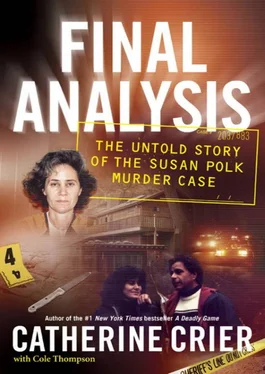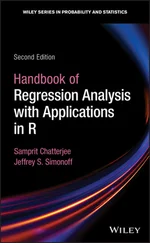On Monday, Susan continued her testimony with a long-awaited explanation of the events of October 13, 2002. Her story of that night began by explaining how she went to the guesthouse to talk to her husband. When he answered the kitchen door, he was wearing black briefs but refused to put on pants, saying that he couldn’t be bothered.
Upon entering the house, Susan sat as far from Felix as she could in the tiny cabin-like guesthouse, intending to discuss their finances and a plan for Gabe’s education. During the conversation, Susan made a sarcastic comment that infuriated Felix, and he hit her in the face.
“I staggered back and pulled out the pepper spray. I sprayed him right in the face, and he was just angrier.”
She reached for the metal Maglite flashlight sitting on the coffee table beside the leather chair and “tapped him on the right temple,” indicating that the “tap” “did not stop him at all.” He was “absolutely enraged” and raced at her with the ottoman, eventually grabbing her by the hair and dragging her to the floor. She was on her back, knees up, and Felix was on top of her.
“He rubbed the pepper spray off his hands and into my eyes,” Susan contended. “It was oily and orange-ish. My eyes were burning. I was thinking, ‘Oh my God. I’m dead. I’m in the worst possible situation.…He punched me again in the face. I was completely stunned. I opened my eyes and I saw the knife coming down and it went into my pants,” Susan said, without explaining how, or where, Felix had obtained the knife.
“It’s hard to see the cut ’cause I sewed it up later,” Susan insisted, holding up a pair of jeans she pulled from a brown evidence bag. Several coins tumbled from the pockets as she scanned the jeans for a tiny “nick” the knife made when it entered her left pant leg. “I saw it come down and go in,” she insisted, putting on her eyeglasses to aid in her search of the garment. Susan noted the jeans were her favorite pair and she had washed them after the tussle. She also showered several times that night.
The bailiff held the jeans up for jurors as Susan described the “flash” she experienced as Felix was stabbing at her with the knife. “I thought, ‘unless you do something right now, you’re going to die. He’s going to kill you.’” With this realization, Susan briefly contemplated letting herself die but quickly changed her mind, and pulling her leg back, she delivered a swift kick to Felix’s groin with the heel of her foot and then grabbed for the knife, which nearly fell from his grip as he reacted to the sharp jolt. “It was a very strong kick,” she said. “He was stunned.”
Susan claimed she warned her husband, “Stop, I’ve got the knife.” But he kept coming at her. She recalled stabbing her husband just five or six times. After repeatedly demanding that Felix “get off” of her, he finally rose to his feet and said, “Oh my God, I think I’m dead.”
“He rocked back and forth on his feet. He swayed…and he just fell straight back.”
Susan ran to the bathroom to clear the pepper spray from her eyes. When she returned, Felix’s eyes were open, staring up at the ceiling, but he was not breathing. At that moment, memories of their years together flooded back. She recalled their first meeting, the day they wed, the children they raised, but the good memories soon gave way to bad, and the façade of their relationship crumbled as she thought about the years of abuse and marital difficulties.
According to her version of events, Susan remained in the cottage for about thirty minutes, carrying on a conversation with her dead husband, asking the questions in death that she never managed to ask in life. Standing on the stairs, she spoke to him, trying in vain to understand this man who had been a mystery to her for more than twenty years, at one point yelling at the body, “How could you do that to your children?”
Susan’s testimony proved surreal. While she had long highlighted different aspects of that night, she had never fleshed out the full picture to the court, never provided any of the details that made her narrative seem human. Now, the court was transfixed by her story, picturing her huddled around the body and trying to make sense of her tenuous situation. It was a vivid image, one that displayed her many inner contradictions. Though she professed to have loathed her husband for years, she could never completely let go of him. In this ending, his death was too abrupt, their relationship too flawed to simply be over, but somehow it was.
Once she moved past the initial shock of her situation, her next thoughts were more practical. “I’m going to be in big trouble,” she realized. She didn’t call police. Instead, she left through the kitchen door and returned to the main house. Holding up a pair of black clogs, Susan identified them as the pair of shoes she was wearing that night. “I don’t wear athletic shoes,” she said plainly. “I have no idea whose shoes those are in the blood. They’re not my sons’.”
That night was sleepless for Susan, who said that she drove Felix’s car to the BART station so that her son wouldn’t see it in the driveway and go to the guesthouse in search of his dad. The following morning, Susan drove Gabe to school, took him out for lunch, ran some errands, and did some housekeeping. “I kept putting off calling the police. I wanted to have a nice day with Gabriel. I just didn’t want to tell him what happened.”
Later in the day, when Gabe asked about Felix, she claimed she had no idea where he might be. “It was like living in two worlds. My husband was dead in the cottage and I was acting and pretending like he hadn’t died,” Susan testified. “I wanted to hang on to some semblance of a normal life for a few more hours.”
She said her son knew better. “He knew. I knew he knew. I just wanted to deny. The look in his eyes,” Susan’s eyes filled with tears. “He thought I’d killed his father…. But Gabe knew there was something wrong. I just wasn’t the mom I always was,” Susan sniffed. “Gabe is so sensitive. We were all so close; we finished each other’s sentences.”
Addressing Gabriel’s earlier claim that Susan had asked Gabriel if he was happy that his dad was gone, Susan claimed that she never actually said those words, but in actuality said “‘He’s gone. You aren’t happy, are you?’” Susan recalled. “I was buying time to put off telling him he’s dead.”
According to Susan, it was this initial lie to Gabriel that enabled her to carry her story forward, even as officers presented her with evidence to the contrary.
“At some point, I decided to lie,” she said. “I thought my best shot at getting out of custody, to take care of my dogs and my son, was to lie. So I did. Once I denied, that was it. I just kept doing that.”
In spite of her lie, Susan admitted that she “would have confessed” if police indicated they were going to arrest Gabe for the crime. “I was relieved that Adam was coming for Gabe,” she said.
Susan went on to maintain, “I didn’t murder Felix, and I didn’t want the stigma of people thinking I murdered him. I just hoped I wouldn’t be charged, but I was.”
As the afternoon progressed, Susan presented jurors with “explanations” for the accusations made in court by prosecution witnesses, but the more she talked the more it appeared that she was fabricating stories. For example, she insisted that Gabe had misconstrued her discussion of purchasing a shotgun, saying that it had nothing to do with murder. In her version of the story, she was shopping for a weapon on the advice of huntsmen in Montana who told her a shotgun would provide good protection from bears during her frequent hikes in the woods. Similarly, she also challenged Gabe’s testimony that she threatened to drown Felix in the pool unless he wired millions of dollars into her bank account. Instead she claimed that she had simply expressed concern that his father would get too drunk one night and “drown” in the pool.
Читать дальше











